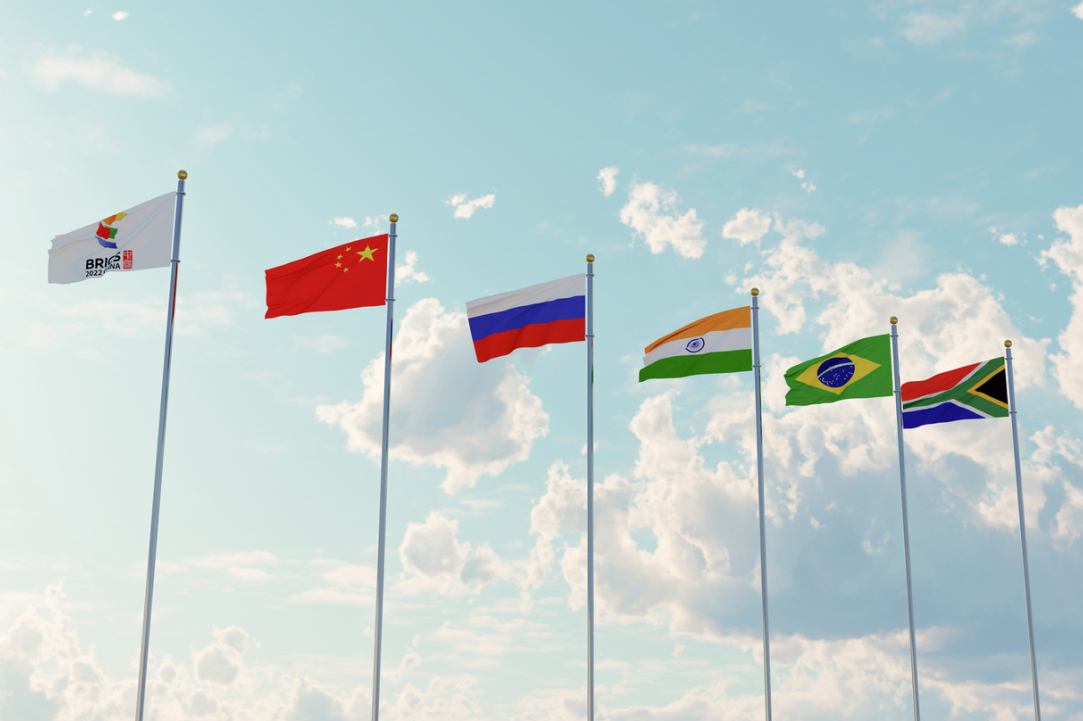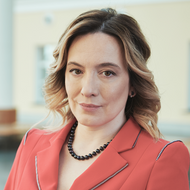‘The BRICS Strategic Partnership Offers the World Creative, Unifying, Forward-Looking Initiatives’

Today, BRICS has become an influential factor in modern international relations and is perceived as one of the pillars of a more just world order. This association is not based on one party’s dominance, but instead, is built on a sound balance of interests. The role of the association was discussed by the participants of the plenary session ‘BRICS Development Strategy: Equal Opportunities in an Unequal World’ at the XXIV Yasin (April) International Academic Conference.
The model of an unequal world order belongs to the past, said Nikita Anisimov, HSE University Rector, in his welcome speech. Today, the world is witnessing the rapid development of countries across Asia, Africa and Latin America. A new Foreign Policy Concept has been recently approved in Russia; it states that only the united efforts of the entire international community based on the balance of forces and interests can provide an effective solution to the numerous problems of our time. This is what the BRICS union is striving for.
‘The BRICS theme is starting to resonate in a new way today. We see strengthening potential, with an increase in the international role of the association, which means the promotion of multipolarity, justice, and mutually beneficial dialogue based on equality. I am sure that our joint work will contribute to the development of our countries' economies. Our expanding dialogue fully meets the needs of regional and inter-regional economic integration, and the formation of a large Eurasian partnership,’ he stressed.
At the same time, the Rector noted that HSE University, as a leading research university in Russia, is extremely interested in interacting with partners from BRICS countries in various fields.
Today, BRICS has become an influential factor in modern international relations, said Sergey Ryabkov, Deputy Minister of Foreign Affairs of the Russian Federation, Russia's sherpa in BRICS. The association embodies the synergy between cultures and civilizations representing different regions of the planet, the cooperation of new centres of power in world politics, global economy and finance. BRICS is rightly perceived as one of the pillars of a more just world order, a guardian of genuine multilateralism based on respect for international law and the sovereign choice of countries’ own path for development.

Sergey Ryabkov
‘The BRICS strategic partnership offers the world creative, unifying, forward-looking initiatives aimed at finding collective answers to the most pressing issues on the international agenda, including achieving sustainable development goals, ensuring food and energy security, promoting the post-pandemic recovery of the world economy, and combating climate change. Our countries have everything necessary for this. Together we represent more than 40% of the world's population, about 30% of the earth's landmass, and a third of the world's GDP at purchasing power parity. This is more than the G7,’ said the Deputy Minister.
He stressed that the pace of mutual trade between the countries in the association shows steady growth, despite the consequences of the pandemic and other obstacles. The BRICS countries are major producers and consumers of agricultural products and energy resources. BRICS accounts for over a third of the world's food supply, including more than 40% of global grain production, and there is potential to increase this further.
Pavel Knyazev, the Ambassador-at-Large of the Russian Foreign Ministry, Russia's Sous Sherpa to BRICS, stressed that BRICS activity is not directed against anyone, it has never been contra, but always only pro, which makes it both strong and attractive, something vividly confirmed in the current turbulent times. Cooperation between the countries of the association is not subject to pressure and restraint from a single centre, but is based on a sound balance of interests. By this logic, the practice of trading in national currencies develops between leading economic centres that do not agree to live under the dominance of one model, in which the dollar is used for unfair competition.

Pavel Knyazev
‘Recent events show that interest in trading in national currencies is growing, despite the pressure exerted on many countries in attempts to undermine cooperation within the framework of BRICS,’ he stressed. Knyazev adds that Russia is determined to develop cooperation with emerging markets, but the expansion should benefit BRICS and the Global South and in no way create obstacles for them.
Currently, more than ten countries have expressed interest in participating in the association. Iran, Argentina and Algeria have already received the official status of candidates for joining BRICS.
It is very important to remember that BRICS countries came together through the initiative of their own governments and their own peoples, and this is not someone's idea from the outside, reminded Victoria Panova, session moderator and HSE University Vice Rector. Unlike other countries, each of the BRICS countries is an independent sovereign state, and they have united on the basis of the principles of respect for international law and multiculturalism. She also invited scientists from the BRICS countries to jointly write a series of textbooks on topics relevant to the ‘Five’ in various fields.
The following experts also presented their reports at the session:
Anil Sooklal, South African Sherpa in BRICS, Rodrigo De Lima Baena Soares, Ambassador Extraordinary and Plenipotentiary of the Federative Republic of Brazil to the Russian Federation, Nandan Unnikrishnan, Distinguished Fellow, Observer Research Foundation (India), Wang Wen, Executive Dean and Professor of Chongyang Institute for Financial Studies (RDCY), Deputy Dean of Silk Road School, Renmin University of China, and Rasigan Maharajh, Chief Director of the Institute for Economic Research on Innovation, Tshwane University of Technology (South Africa).
By Marina Polyakova
See also:
HSE University to Host BRICS International School: New Generation
Registration for the BRICS International School: New Generation, one of the leading international educational projects aimed at prospective leaders interested in the agenda of global development and cooperation within the framework of BRICS, has opened.
Experts Assess How BRICS Countries’ Education Systems Are Evolving
The BRICS Expert Council–Russia, based at HSE University and operating in collaboration with the HSE Institute of Education, has released an analytical report titled ‘The Transformation of General Education in BRICS Countries.’ The study explores how BRICS nations are addressing shared challenges, including equitable access to schooling, digital integration, support for inclusion, linguistic diversity, and intercultural dialogue.
‘Artificial Intelligence Has Become the Lifeblood of the Global Economy’
Experts from HSE University took part in the BRICS Academic Forum (FABRICS) held in the capital of Brazil this year. The main theme of the event was to discuss cooperation among countries in the Global South amid geopolitical turbulence and rapid technological change. Academics and experts from BRICS member states and partner nations explored topics such as global healthcare, AI technologies, trade, climate change, and reform of the multilateral global security and governance architecture.
Roundtable on Russia–China Cooperation in Antimonopoly Policy Held at HSE University
HSE University hosted a roundtable titled ‘New Challenges for Antitrust Regulation: The Chinese Perspective.’ The event was organised by the International BRICS Competition Law and Policy Centre (BRICS Centre). Special guests included Chinese colleagues from the Competition Policy and Assessment Centre (CPAC) of the State Administration for Market Regulation of the People’s Republic of China (SAMR). Last year, the BRICS Centre and CPAC SAMR signed an agreement on strategic cooperation.
24 Countries Represented at 25th Yasin International Academic Conference Held by HSE University
The Programme Committee of the 25th Yasin (April) International Academic Conference on Economic and Social Development has summed up the initial results. In 2025, 1,384 people from 24 countries and 29 Russian regions participated in the conference, with 335 of them delivering presentations.
‘The Trip Exceeded All Our Expectations’: HSE Students Take Part in BRICS Youth Innovation Summit 2025
The BRICS Youth Innovation Summit 2025 was held in Cape Town on April 10–11, 2025. The event was attended by political and business leaders from Brazil, Russia, India, China, and South Africa. The summit focused on the theme ‘Innovating the Future: Technology for Sustainability and Social Good,’ under which the participants presented their projects. Students of the Faculty of Economic Sciences have shared their experiences of the trip to South Africa, their presentations at the BRICS summit, penguin encounters, and more!
Stuck in the Net: How Much Time Children Spend Online
On average, a schoolchild spends 48 hours a week on studies—equivalent to a six-day working week for an adult. This was highlighted by experts at the round table ‘Domains of Children’s Well-Being Evaluation for Human Potential and Evidence-Based Social Policy Development,’ held as part of the 25th Yasin (April) International Academic Conference.
Russian and Chinese Scholars Share Experience of Transformation of Doctoral Education
The Russian and Chinese postgraduate education systems originally borrowed their institutional frameworks from the Soviet Union. However, in the 21st century, they have evolved along different paths. While key performance indicators for postgraduate programmes in Russia are declining, China is seeing a rapid increase in the number of postgraduate students. These contrasting trajectories and the reforms undertaken in each country in recent decades were the focus of a roundtable discussion held as part of the 25th Yasin (April) International Academic Conference.
Nobel Laureate Proposes Solution to Markov Equilibrium Problem
In dynamic games, a Markov equilibrium involves strategies that guide players' behaviour based on the current state of the game, rather than its entire history. This approach is effective when players have access to complete information. But when uncertainty arises in the game—for instance, when players are unsure of who they are dealing with—this approach can become problematic. Eric Maskin, Nobel Laureate in Economics and Professor at Harvard University, addressed this issue in a paper presented at the XXV Yasin (April) International Academic Conference on Economic and Social Development held at HSE University from April 15 to 18, 2025.
‘The World Is Becoming More Complex and Less Predictable’: What Scientists Say about the Future
The future is now more difficult for researchers to forecast, and events that are hard to predict are playing an increasingly significant role. But there is good news too: scientists are confident that humanity will adapt to any changes. This was the focus of discussion at the International Symposium ‘Foresight in a Rapidly Changing World,’ which took place as part of the 25th Yasin (April) International Academic Conference.




